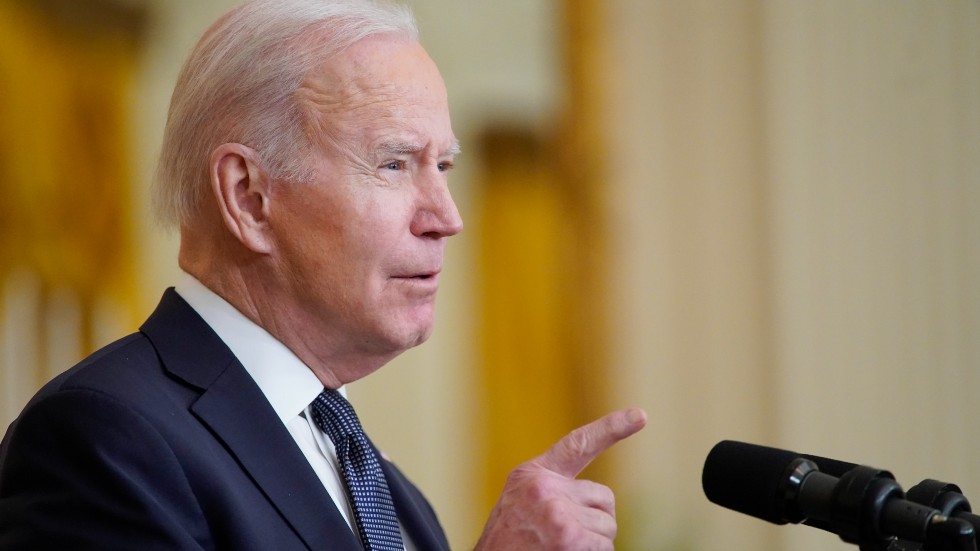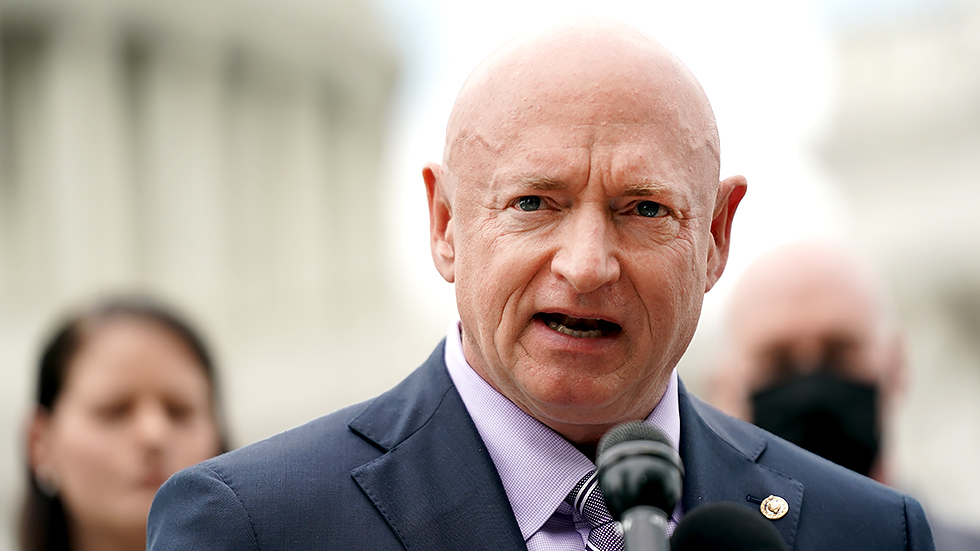Overnight Energy & Environment — Biden says Russia attack could spike oil prices

Welcome to Tuesday’s Overnight Energy & Environment, your source for the latest news focused on energy, the environment and beyond. Subscribe here: digital-stage.thehill.com/newsletter-signup.
Today we’re looking at the president’s comments on a potential Russian invasion and how it could impact energy prices, discussions on a possible gas tax suspension and a green manufacturing push from the White House.
For The Hill, we’re Rachel Frazin and Zack Budryk. Write to us with tips: rfrazin@digital-stage.thehill.com and zbudryk@digital-stage.thehill.com. Follow us on Twitter: @RachelFrazin and @BudrykZack.
Let’s jump in.
President warns of rising energy prices

President Biden on Tuesday warned that there will be consequences for Americans at home if Russia decides to invade Ukraine, notably through prices at the gas pump.
“I will not pretend this will be painless, there could be impact on our energy prices. So, we are taking active steps to elevate the pressure on our own energy markets to offset raising prices,” Biden said in remarks at the White House.
The president said those steps include coordinating with major energy consumers and producers and working with Congress on additional measures in order to address the impact of gas prices.
A fresh warning: The president warned Russian President Vladimir Putin against invading Ukraine in his remarks, saying it would be a “self-inflicted wound” for Russia. He urged Russia to choose the diplomatic route as the Biden administration has tried to deter the Kremlin from launching an attack, which U.S. officials have warned could happen at any day.
“To be clear, if Russia decides to invade, that would also have consequences here at home. But, the American people understand that defending democracy and liberty is never without cost,” Biden said.
The background info…Russia was the third-biggest supplier of foreign petroleum for the U.S in 2020, according to the U.S. Energy Information Administration, and responsible for 7 percent of imported oil. Russia also exported $13 billion in mineral fuels to the U.S. in 2019, which was more than half of all goods sent to America.
Dems’ gas tax holiday idea meets pushback

A plan by a group of Senate Democrats, many of whom face tough reelection bids, to suspend the gas tax amid high energy prices is facing bipartisan pushback, underscoring the uphill climb to passing the legislation.
Democratic Sens. Mark Kelly (Ariz.), Maggie Hassan (N.H.), Raphael Warnock (Ga.) and Catherine Cortez Masto (Nev.), who are each up for reelection in November, as well as Democratic Sens. Debbie Stabenow (Mich.) and Jacky Rosen (Nev.), introduced legislation to suspend the approximately 18-cents-per-gallon tax on the fuel until the start of 2023.
But the idea is getting pushback from GOP senators, whose support the legislation would need to ultimately pass, as well as some Democrats who are signaling early skepticism.
So, what did Republicans have to say? “I think it’s just a clearly, transparent political move to try and give political cover to a handful of Democrats that are up in states this year where gas prices are going to be a big issue,” said Sen. John Thune (S.D.), the No. 2 Senate Republican.
Sen. Lisa Murkowski (R-Alaska) added that a temporary suspension of the gas tax also is “not anything that addresses the bigger problem.”
“My view the bigger problem is we need to be producing more of our here, rather than relying on it for others,” Murkowski added.
The Washington Post reported on Tuesday that the Biden administration and Democrats are discussing suspending the gas tax through the rest of the year, with the White House telling the Post that “all options are on the table.” Senate Democrats also discussed the idea during a closed-door caucus lunch on Tuesday as they home in on so-called kitchen table economic issues with an eye on the midterm elections.
“We are focused on getting costs down, and you’re going to see a lot of activity in March … from us on that issue,” Senate Majority Leader Charles Schumer (D-N.Y.) told reporters.
Schumer added that Democrats are having a “caucus discussion” on the gas tax but “we haven’t yet taken a caucus position on it.”
But the idea has drawn pushback from some Democrats as well.
And what about Democratic skeptics? Sen. Joe Manchin (D-W.Va.) warned that suspending the gas tax “just doesn’t make sense” because it could negatively impact federal highway funds.
“People want their bridges and their roads, and we have an infrastructure bill we just passed this summer, and they want to take that all away,” Manchin said.
Read more from The Hill’s Jordain Carney.
ON THE RISE
Sea levels along U.S. coasts are projected to rise up to a foot between now and 2050, an increase equivalent to the rise seen in the past century, according to a report released Tuesday by the National Oceanic and Atmospheric Administration (NOAA).
In a statement, White House climate adviser Gina McCarthy called the finding a “reconfirmation that our climate crisis …is blinking ‘code red.’”
NOAA projected sea levels will increase 10 to 12 inches, with regional variations, over the next three decades. The increase is projected to be highest along the Gulf Coast, where the report expects an increase of 14-18 inches, followed by 10-14 inches along the East Coast. On the West Coast, NOAA projected an increase of 4-8 inches, while the Caribbean is projected to see a rise of 8-10 inches.
And it said that “major” flooding events will occur once every five years on average, a sharp increase from current levels.
Read more about the latest findings here.
COMING SOON FROM THE HILL
Introducing NotedDC: The Hill’s curated commentary on the beat of the Beltway. Click here to subscribe to our latest newsletter.
Biden officials try to tackle industrial emissions

The Biden administration announced a slew of actions on Tuesday aimed at promoting green manufacturing and taking on climate change contributions from the industrial sector.
A new fact sheet from the White House said it would aim to do so through a series of initiatives aimed at bolstering clean hydrogen energy and using the federal government’s purchasing power to advance its climate goals, among other efforts.
Wait…why does federal purchasing sound familiar? The purchasing efforts come as a Postal Service move to largely replace its fleet with gas-powered instead of electric vehicles remains a major point of contention.
The Postal Service is led by Louis DeJoy, whom Biden can’t replace at will. DeJoy has said that the mostly gasoline fleet is the cheaper option, much to the chagrin of administration officials and congressional Democrats.
The hydrogen specifics…The Energy Department announced that it will take a step toward carrying out programs initiated by the Bipartisan Infrastructure Law on clean hydrogen — which is when hydrogen energy is produced using clean energy — by issuing new requests for information from stakeholders.
The White House’s fact sheet said that its hydrogen efforts will be particularly important for hard-to-decarbonize sectors and processes, including steel manufacturing.
The largest hydrogen program from the bipartisan legislation that’s being advanced on Tuesday is an $8 billion initiative to establish regional clean hydrogen hubs that aim to advance the fuel’s production, processing, delivery, storage and end-use.
There will also be requests for a $1 billion initiative that supports research, development and demonstration to commercialization and deployment in an effort to cut costs and boost efficiency as well as a $500 million program supporting the fuel’s manufacturing and recycling.
The purchasing specifics…Its purchasing efforts include efforts from the General Services Administration to buy low-carbon concrete and asphalt. It also includes efforts to use cleaner materials in federal transportation projects at the Department of Transportation including a pilot program incentivizing the acquisition of low carbon materials and the creation of a DOT working group that will assess and take actions to cut emissions from construction materials used in transportation infrastructure.
And it will expand a State Department effort known as the First Movers Coalition, which aims to help companies use their purchasing power to drive demand for clean goods, to include the aluminum, cement, chemicals and carbon removal sectors.
So, what’s the deal with industrial emissions? The green manufacturing effort at large also comes as the industrial sector, which includes manufacturing and construction, is responsible for nearly a quarter of the U.S. contribution to climate change. Some industries including steel and cement are considered harder to cut emissions from because of technological or cost-related challenges.
Read more about the administration’s push here.
ON TAP FOR TOMORROW
- The Senate Environment and Public Works Committee will vote on two EPA nominees, and then hold a hearing on biofuels
WHAT WE’RE READING
- White House Takes Aim at Environmental Racism, but Won’t Mention Race (The New York Times)
- AP FACT CHECK: Biden takes half-steps on electric vehicles (The Associated Press)
- Alberta to toughen oil sands emissions standards that reward big Canadian polluters (Reuters)
- Hawaii health officials lift drinking water advisory for Red Hill housing (Honolulu Star-Advertiser)
ICYMI
- New study casts doubt on ethanol’s climate benefits
- Senate passes bill to make former internment camp national historic site
- UN report: Pollution causing more deaths than first 18 months of COVID-19 pandemic
And finally, something offbeat but ON-beat: Did you catch this weekend’s EV Superbowl ads?
That’s it for today, thanks for reading. Check out The Hill’s energy & environment page for the latest news and coverage. We’ll see you Wednesday.
Copyright 2023 Nexstar Media Inc. All rights reserved. This material may not be published, broadcast, rewritten, or redistributed. Regular the hill posts







